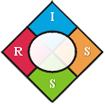Special Session on Rough and Fuzzy Similarity Modelling Tools
Special Session on Rough and Fuzzy Similarity Modelling Tools
For centuries the concept and properties of similarity has been the subject of study and a vehicle for establishing and describing the existing relations between objects. Beginning with Plato who considered it in the form of "analogy", the notion of similarity manifested itself throughout the development of philosophical investigations regarding reasoning. Nowadays it plays an ever-increasing role in describing and understanding reasoning and cognition. Similarity that binds entities in an approximate, imprecise way is in the core of soft and granular methods of computing.
There are studies on numerous approaches to modelling, expressing and utilizing similarity relations within the widely understood area of soft computing. In rough sets, modelling similarity is essential for both standard approaches and extensions concerning the analysis of complex data. Analogously, fuzzy systems strongly relate to modeling of similarities as well. Numerous applications of rough and fuzzy sets in the fields of information processing, decision support, recommendation and others testify to the importance and usefulness of similarity-based tools.
In the proposed special session, we intend to bring together researchers whose work corresponds to similarity modelling and handling, in particular with a use of rough and fuzzy approaches.
The overall goal is to collect and review various methods for modelling similarity and scenarios of
their application.
Topics include but are not limited to:
- Rough sets and their extensions
- Tolerance and neighborhood models
- Similarity in granular computing
- Fuzzy rough sets
- Fuzzy similarity
- Similarity modelling tools
- Tversky's contrast model
- Ontology-based similarities
- Similarities in hierarchical systems
- Similarity aggregations
- Applications of similarity models
- Similarity in data clustering
- Similarity-based reasoning
- Similarity in decision support systems
- Similarity in recommendation systems
- Similarity in three-way decision-making
Session Organizers:
Łukasz Sosnowski, Systems Research Institute, Polish Academy of Sciences, Warsaw, Poland
Email: Lukasz.Sosnowski@ibspan.waw.pl Principal contact
Marcin Szczuka, Institute of Informatics, University of Warsaw, Warsaw, Poland
Email: szczuka@mimuw.edu.pl
Dominik Ślęzak, Institute of Informatics, University of Warsaw, Warsaw, Poland
Email: slezak@mimuw.edu.pl
Deadline of submission: January 15th, 2017
Conference website: http://ipmu2018.uca.es/submission/
Pdf file: Download
